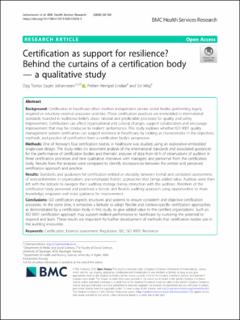Certification as support for resilience? Behind the curtains of a certification body — a qualitative study
Peer reviewed, Journal article
Published version
Permanent lenke
https://hdl.handle.net/11250/3042031Utgivelsesdato
2020Metadata
Vis full innførselSamlinger
Originalversjon
Johannesen, D. T. S., Lindøe, P. H., & Wiig, S. (2020). Certification as support for resilience? Behind the curtains of a certification body—a qualitative study. BMC health services research, 20(1), 1-14. 10.1186/s12913-020-05608-5Sammendrag
Background
Certification in healthcare often involves independent private sector bodies performing legally required or voluntary external assurance activities. These certification practices are embedded in international standards founded in traditional beliefs about rational and predictable processes for quality and safety improvement. Certification can affect organizational and cultural changes, support collaboration and encourage improvement that may be conducive to resilient performance. This study explores whether ISO 9001 quality management system certification can support resilience in healthcare, by looking at characteristics in the objectives, methods, and practice of certification from a certification body’s perspective.
Methods
One of Norway’s four certification bodies in healthcare was studied, using an explorative embedded single-case design. The study relies on document analysis of the international standards and associated guidances for the performance of certification bodies and thematic analyses of data from 60 h of observations of auditors in three certification processes and nine qualitative interviews with managers and personnel from the certification body. Results from the analyses were compared to identify discrepancies between the written and perceived certification approach and practice.
Results
Standards and guidances for certification embed an elasticity between formal and consistent assessments of nonconformities in organizations and emphasize holistic approaches that brings added value. Auditors were then left with the latitude to navigate their auditing strategy during interaction with the auditees. Members of the certification body perceived and practiced a holistic and flexible auditing approach using opportunities to share knowledge, empower and make guidance for improvement.
Conclusions
ISO certification expects structures and systems to ensure consistent and objective certification processes. At the same time, it embodies a latitude to adopt flexible and context-specific certification approaches, as demonstrated by a certification body in this study, to give added value to the certified organizations. Such an ISO 9001 certification approach may support resilient performance in healthcare by nurturing the potential to respond and learn. These results are important for further development of methods that certification bodies use in the auditing encounter.

